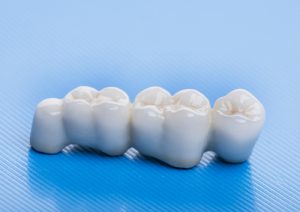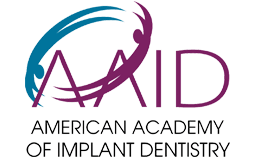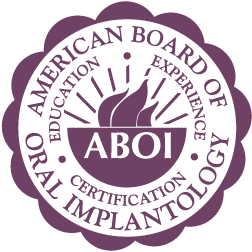Restore Your Smile With Dental Bridges for Missing Teeth
Losing a tooth can be a challenging experience, impacting both the aesthetics and functionality of your smile. Thankfully, dental bridgesoffer a popular and efficient solution for replacing missing teeth. Don’t let your dental health deteriorate — replace your missing tooth or teeth at Family Implant & Reconstructive Dentistry.
Get in touch with ourdentist in Havre de Grace, MDtoday by calling our dental office at (410) 939-5800. We’ll arrange your consultation promptly to help you restore your oral health.
What Are Dental Bridges?
Dental bridgesare prosthetic devices designed to replace missing teeth. They comprise one or more artificial teeth supported by the surrounding teeth or dental implants, with the abutment tooth playing a crucial role in supporting the bridge by anchoring the dental crowns. Dental bridges can be crafted from various materials, including porcelain, ceramic, or metal.
Different Types of Dental Bridges
There are several types of dental bridges, including:
- Traditional Dental Bridge: The most common type of dental bridge, consisting of one or more artificial teeth anchored to adjacent teeth using dental crowns.
- Cantilever Dental Bridge: Used when there’s only one adjacent tooth available to support the artificial tooth.
- Maryland Dental Bridge: Also known as Maryland bridge or Maryland bridges, this type is made of a metal or porcelain framework bonded to the back of supporting teeth. Maryland dental bridges are typically used to replace front teeth.
- Implant-Supported Bridge: Supported by dental implants instead of natural teeth, offering a more durable and long-lasting option, albeit at a higher cost.
- Resin Bonded Bridge: This type of dental bridge uses a metal or porcelain framework bonded to existing teeth. Resin bonded bridges are commonly used for individuals missing front teeth.
Traditional Dental Bridge
A traditional dental bridge is the most common type of dental bridge. It consists of a false tooth or teeth held in place by dental crowns cemented onto each of the abutment teeth. The abutment teeth are prepared to receive the dental crowns, which involves removing some of the enamel and dentin to make space for the crowns. A traditional bridge is suitable when there are natural teeth on both sides of the gap created by the missing tooth. The bridge is designed to look like natural teeth and can be made from various materials, including porcelain, ceramic, or metal.
Why Choose Dr. Grubb for Dental Bridge Placement?
Consider our dental office in Havre de Grace, MD, for tooth bridges for the following reasons:
- Experience:Dr. Grubb has likely earned a strong reputation within the Havre de Grace community due to his experience and expertise in dentistry.
- Patient-Centered Approach:Focusing on patient comfort and satisfaction is often crucial when selecting a dentist.
- Advanced Technology:Access to advanced technology can streamline the crown placement process and potentially enhance outcomes.

- Positive Reviews:Positive online reviews and testimonials from other satisfied patients can foster trust and confidence in a dentist.
Dental Bridge Benefits
Replacing a missing tooth or teeth with a bridge can provide the following dental bridge benefits:
- Restored smile
- Enhanced functionality
- Maintains facial structure
- Prevents further dental complications
- Long-lasting restoration
- Cost-effective solution
- Boost in confidence
- Minimally-invasive procedure
To arrange your consultation, contact Dr. Grubb at Family Implant & Reconstructive Dentistry by calling (410) 939-5800today. Dr. Grubb will also inform you of possibledental bridge risks and complications at your consultation.
Dental Bridge Procedure
Thedental bridge procedureinvolves preparing the adjacent teeth, known as abutments, by reshaping them to support the bridge. A custom-made bridge, consisting of the replacement tooth or teeth (called pontics) and crowns for the abutment teeth, is then placed over the prepared teeth with dental cement, restoring both function and aesthetics.
During this process, a temporary bridge may be used as a placeholder while patients await their final dental restorations or during the healing period after surgical procedures.
The bridge is securely cemented in place, providing a fixed solution for missing teeth. After receiving a dental bridge, proper care ensures its longevity, so be sure to schedule regular dental check-ups and maintain a consistent oral hygiene routine at home.
Recovery and Aftercare
After a dental bridge procedure, it’s essential to follow a properdental bridge recovery and aftercare routineto ensure the bridge lasts for a long time. Here are some tips:
- Avoid eating hard, sticky, or crunchy foods for a few days after the procedure.
- Brush and floss your teeth gently, paying special attention to the bridge and surrounding teeth.

- Use a soft-bristled toothbrush and a fluoride toothpaste.
- Avoid using a waterpik or other oral irrigators for a few days after the procedure.
- Attend follow-up appointments with your dentist to ensure the bridge is functioning properly and to make any necessary adjustments.
The Costs of a Dental Bridge
While thecosts of your dental bridgewill vary based on several factors, you can anticipate spending between $2,000 and $5,000. Factors influencing the total cost include:
- Geographical location
- Materials used
- The type of dental bridge (cantilever bridge, implant-supported bridge, traditional fixed bridge, Maryland dental bridge) needed
- Number of teeth that need to be replaced
- Dentist’s expertise and experience
- Dental insurance plan
- Additional procedures
Can You Get a Dental Bridge?
Being a candidate for a dental bridgedepends on several factors. Our dentist will consider the following before recommending a dental bridge procedure:
- Location of Missing Teeth: A dental bridge requires a healthy natural tooth on either side of the gap to serve as abutments (support). If there aren’t stable natural teeth on either side, a bridge may not be an option.
- The Health of Remaining Teeth: The remaining teeth need to be strong enough to support the bridge. This means they should be free of decay and gum disease and should have good bone support. If the remaining teeth are compromised, they might not be suitable as abutments, or they might require treatment first.
- Number of Missing Teeth: Traditional bridges are generally suitable for replacing one to three adjacent missing teeth. If more teeth are missing, or they’re spread out, other options like partial dentures or dental implants might be more appropriate.

- Oral Hygiene: Patients should have good oral hygiene habits or be willing to improve them. A bridge requires meticulous cleaning around and under the false tooth/teeth.
- Gum Health: Patients with untreated gum disease might not be good candidates for a dental bridge until the gum issues are addressed.
- Occlusion (Bite) Considerations: The way the upper and lower teeth come together (the bite) can influence the success of a bridge. If there are significant bite issues, they might need to be addressed either before or in conjunction with a bridge placement.
- Bone Loss: If a tooth has been missing for a long time, there can be significant bone loss in that area. While this doesn’t necessarily preclude someone from getting a bridge, it might make other options like implants more challenging without additional procedures like bone grafting.
Financing Dental Bridges in Havre de Grace, MD
We understand that the cost of dental treatments can be a concern. That’s why we offer a variety offinancing optionsto make dental bridges more accessible to our patients in Havre de Grace.
Dental Insurance:
- We work with most major dental insurance providers.
- Our team will help you maximize your insurance benefits for dental bridge procedures.
CareCredit:
- CareCredit offers flexible financing options, including interest-free plans for up to 24 months and low-interest long-term plans.
- Apply online easily and use your CareCredit card at numerous providers nationwide.
- Contact us to learn more about how CareCredit can help you afford your dental bridge.
Frequently Asked Questions
How long do dental bridges last?
Can a dental bridge be whitened if it becomes stained?
Schedule Your Dental Bridge Consultation With Dr. Grubb Today
Are you ready to replace your lost teeth? Don’t wait any longer! Call Family Implant and Reconstructive Dentistry in Havre De Grace, MD, at (410) 939-5800today toschedule a consultation. We’re happy to meet new and returning patients from the Havre De Grace area, including Perryville, Aberdeen, and Churchville, MD. Dental bridges can restore your smile and help you find the confidence you once had.
We can’t wait to meet you and help you achieve exceptional oral health!




